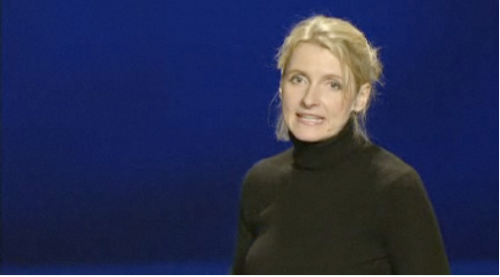I enjoy the eclectic musings that bubble up out of TED talks, but I don’t hang out at that site often enough to catch up on what brilliant people are saying in their intense, 18-minute lectures. I would really be an unstoppable force of knowledge if I just took a weekend and watched their whole damn library.
Until then, I’ll settle for this recent gem of theirs: a talk by author Elizabeth Gilbert (“Eat Pray Love”) on creators finding a way to cope with “the utter, maddening capriciousness of the creative process.” If you’re a creative thinker of any variety, it’s a really fascinating and uplifting 19 minutes:
She asks a neat metaphysical question about creation: How much of our inspiration can be considered divine? She’s not initiating a “Does God exist” conversation, but rather introducing a clever way for a creator to separate herself from the pressure of coming up with brilliance all by herself — especially when that selfsame pressure kills creativity.
In ancient Greece and Rome, creativity was thought to be something divine channeled through the creator by an outside force: a “genius” (like your own personal Muse). Once the Renaissance rolled around, philosophers nixed the notion of magical fairies doing our creative loadbearing. Now the genius was no longer external to the creator, it became the creator, as in “Leonardo, you’re such a genius!” In other words, ancient artists were protected from narcissism (because they could not claim all the credit), but modern artists were now free to acquire big, fat egos. She says:
I think that was a huge error. … Allowing one mere person to believe he or she is like the vessel, the font, the essence and the source of all divine, creative, eternal, unknowable mystery is just a smidge too much responsibility to put on one fragile, human psyche.
Her solution? It’s nifty: Bring back this divine Muse of yours, and imagine it as a writing partner, one who can help you shoulder the load. You, the artist, just have to do your part by showing up each day, working and sweating, even when you’re sure your creaiton is a failure. If you’re unhappy with the state of your creation, turn to your Muse and ask it it step up its commitment, because, by God, you’re not going to stop doing your share.
“I’m putting everything I have into this,” she says, addressing her divine genius. “If you want it to be better, then you gotta show up and do your end of the deal. If you don’t do that? Well, the hell with it, I’m still going to be doing this, because that’s my job. And I would like the record to reflect that today I showed up for my part of the job.”
That’s so useful. As a writer, I’ve found it’s easy to get bogged down by my own inability to make something better (or to make something at all, given the day). Am I losing my stuff? Did I ever have stuff? Will I ever have stuff again?
Gilbert’s technique lets creators replace this anguish with something tangible (“Get to work!”), and transfer their artistic torment to someone else for a change. And if you work hard enough, maybe you can guilt that creative djinni into a dollop of inspiration before you retire the keyboard for the day.
(Thanks to Webcomic PVP Online for calling my attention to this talk. Are you reading PVP? Good humor there, geekish and real. Try it for a week, or your money back!)




In reference to: “Am I losing my stuff? Did I ever have stuff? Will I ever have stuff again?” I ask myself this after months of being unemployed. Do you lose your edge, your mind, the creative thinking that got you to where you are in the first place? Maybe a piece of it. Does it come back? Only if you use that grey stuff.
Which is why I keep crossword puzzles by my bedside. It’s like my Great Wall to keep out the Alzheimer’s Horde. Seeing as how the Great Wall didn’t keep the Mongols out of China, I think I need a new metaphor.
Concentrated and Stabilized Purity certified, Omega 3 Fish Oils, also help.
If I didn’t know better, jb, I would have accused you of being in the pocket of Big Fish Oil. Good thing I know better.
It really works! YAK!